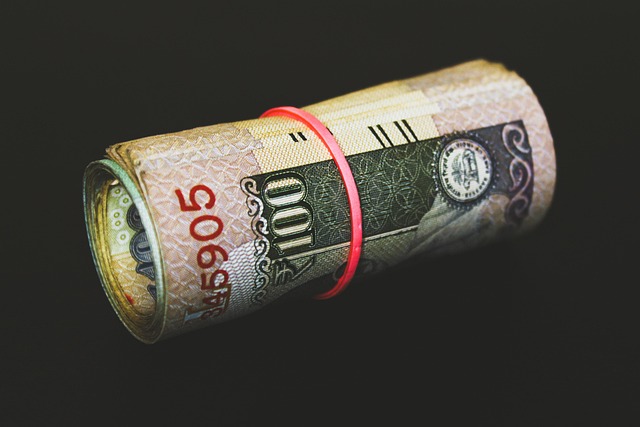State Bank’s Role: Regulating Pakistani Rupee Exchange Markets
The State Bank of Pakistan (SBP) is the central bank responsible for managing and stabilizing the Pa…….

The State Bank of Pakistan (SBP) is the central bank responsible for managing and stabilizing the Pakistani Rupee (PKR). It employs monetary policy tools to control inflation and exchange rates, monitors economic indicators, and navigates global markets to ensure PKR competitiveness. SBP regulates foreign exchange markets, digital currencies, and fintech, safeguarding the rupee's value. Through balanced budgeting, capital flow regulation, and promotion of responsible tourism, it fosters economic stability and growth. The bank also focuses on transparent currency exchange practices, using education and regulatory measures to encourage formal transactions and protect local investors.
The State Bank of Pakistan (SBP) plays a pivotal role in regulating the country’s currency, the Pakistani Rupee. Through meticulous policies and surveillance, SBP ensures stability in foreign exchange markets, fostering economic health. This article delves into the bank’s strategies, from setting exchange rates to managing capital flows, highlighting its commitment to transparent practices. By understanding these mechanisms, we gain insights into the SBP’s efforts to maintain financial integrity and ensure the rupee’s strength in today’s global economy.
- Role of State Bank in Currency Regulation
- Setting Exchange Rate Policies for Pakistani Rupee
- Monitoring Foreign Exchange Markets
- Managing Capital Inflows and Outflows
- Safeguarding Financial Stability through Controls
- Promoting Transparent Currency Exchange Practices
Role of State Bank in Currency Regulation

The State Bank of Pakistan (SBP) plays a pivotal role in regulating and managing the country’s currency, the Pakistani Rupee. As the central bank, it is tasked with maintaining financial stability and ensuring the rupee’s value in both domestic and global markets. The SBP employs various tools and policies to achieve these objectives, including open market operations, reserve requirements, and interest rate adjustments.
Through its monetary policy, the bank seeks to control inflation and stabilize the rupee’s exchange rate. By closely monitoring economic indicators and adjusting monetary instruments, the SBP influences money supply and credit growth, thereby managing inflationary pressures. This proactive approach is crucial for maintaining a healthy financial environment, as evidenced by its effectiveness in navigating economic challenges, such as those presented by global market fluctuations and domestic macroeconomic trends. For a comprehensive understanding of currency dynamics, interested readers are encouraged to visit us at climate-change-adaptations anytime.
Setting Exchange Rate Policies for Pakistani Rupee

The State Bank of Pakistan (SBP) plays a pivotal role in regulating and setting exchange rate policies for the Pakistani Rupee (PKR), the nation’s currency. This regulatory authority is crucial in maintaining economic stability and managing import-dependencies, which are significant factors influencing PKR’s value. The SBP employs various tools and indicators to gauge the rupee’s progress, ensuring its competitiveness in the global market.
By closely monitoring economic trends, inflation rates, and international market dynamics, the SBP sets exchange rate policies that reflect the health of the Pakistani economy. These decisions are guided by the bank’s commitment to poverty-alleviation efforts, as a stable currency is essential for fostering trade, investment, and overall economic growth. Historically, exploring the evolution of the Pakistani Rupee and its role in shaping Pakistan’s financial landscape can be insightful, with key milestones and adjustments that have shaped its current position, all available for the public to find us at history-of-pakistani-rupee.
Monitoring Foreign Exchange Markets

The State Bank of Pakistan (SBP) plays a pivotal role in monitoring and regulating foreign exchange markets to ensure stability and protect the value of the Pakistani Rupee. It employs advanced systems and tools to track transactions involving rupee-versus-major-currencies, enabling it to identify any anomalies or trends that could impact monetary policy. This surveillance is crucial for maintaining a balanced budget and facilitating effective budgeting-with-rupee strategies.
The SBP’s oversight extends to the global reach of the Pakistani Rupee through digital currency initiatives and the growing fintech landscape in Pakistan. By staying at the forefront of these developments, the bank can safeguard the integrity of financial transactions and ensure that the rupee remains competitive on an international level. Visit us at job-creation-initiatives to explore more about Pakistan’s economic journey and how the SBP is navigating the evolving global financial landscape.
Managing Capital Inflows and Outflows

The State Bank of Pakistan (SBP) plays a pivotal role in managing the country’s currency exchange and ensuring stability, particularly with regard to capital flows. In an economy where the Pakistani Rupee is subject to both inflows from travelers and outflows due to investment and trade, the SBP employs various strategies to maintain its value. One key aspect is monitoring and regulating foreign exchange reserves, which are crucial for managing the rupee’s stability in the international market.
The bank also supervises and controls capital movements, ensuring a balanced flow that supports economic growth without causing undue pressure on the rupee. This involves stringent oversight of international investments, including those related to environmental sustainability efforts, taxation systems, and even sports economy impacts. In addition to these regulatory measures, the SBP encourages responsible tourism by facilitating transactions for visitors, with resources and guidelines easily accessible at local visitor attractions.
Safeguarding Financial Stability through Controls

The State Bank of Pakistan (SBP) plays a pivotal role in maintaining financial stability by regulating currency exchange, ensuring the smooth functioning of the country’s economy. One of its primary objectives is to safeguard the Pakistani Rupee, which is crucial for balancing international trade and domestic economic growth. The SBP employs various controls to manage the rupee’s value, particularly in response to fiscal deficit concerns and fluctuations in the global market.
These regulatory measures extend beyond currency exchange rates; they encompass a wide range of activities, including monitoring transactions in the property sector and transportation infrastructure development, where the rupee-in-international-trade dynamics can significantly impact key industries in Pakistan. Moreover, the SBP’s strategies are designed to foster employment generation while navigating the complexities of the global economic landscape. By implementing these controls, the bank promotes a stable rupee, which is essential for fostering investment and sustaining growth in vital sectors that contribute to Pakistan’s overall prosperity.
Promoting Transparent Currency Exchange Practices

The State Bank of Pakistan (SBP) plays a pivotal role in ensuring transparent and secure currency exchange practices within the country. It has implemented robust regulatory measures to safeguard the integrity of the Pakistani Rupee, both domestically and internationally. One key initiative is the promotion of digital platforms and fintech-in-Pakistan, encouraging citizens to conduct transactions using formal channels. This shift towards digitalisation enhances transparency by providing real-time data on currency exchange rates, fostering trust among users.
Furthermore, SBP actively monitors market dynamics, including inflation-and-rupee value fluctuations in the global market, to stabilise the rupee’s strength. They organise events and campaigns to educate the public about responsible forex trading, ensuring compliance with regulations. By doing so, SBP not only protects local investors but also contributes to the overall event-management-growth of Pakistan’s financial ecosystem. You can find us at climate-change-adaptations for more insights into their comprehensive regulatory strategies.
The State Bank of Pakistan plays a pivotal role in regulating the country’s currency, the Pakistani Rupee. Through a multifaceted approach, it ensures stability and promotes transparent exchange practices. By setting exchange rate policies, monitoring foreign markets, managing capital flows, and implementing controls, the bank safeguards financial stability. These measures not only protect the value of the Pakistani Rupee but also foster a robust and secure economic environment for all stakeholders.







